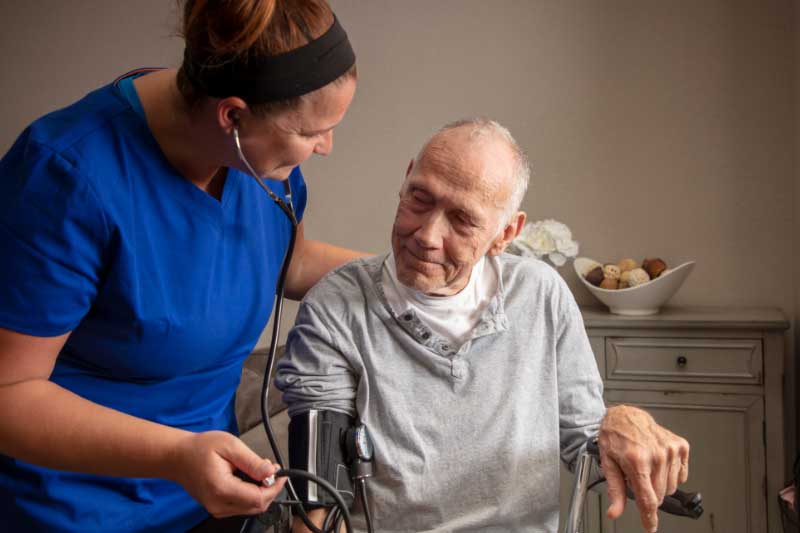Amyotrophic Lateral Sclerosis (ALS), often referred to as Lou Gehrig’s disease, is a progressive neurodegenerative disorder that affects nerve cells in the brain and spinal cord. For patients diagnosed with ALS and their families, the path ahead can feel fraught with uncertainty, emotional strain, and physical challenges. While remarkable advancements in medical care help improve the quality of life, there eventually comes a time when comfort and support become the primary focus.
This is where hospice care comes in. Designed for patients with terminal illnesses, hospice care emphasizes dignity, comfort, and a holistic approach to caregiving, making it a critical resource for ALS patients and their loved ones.
Read on as we explore how hospice care specifically benefits ALS patients and their families, offering relief and guidance at an incredibly challenging time.
Understanding Hospice Care
Hospice care focuses on providing physical, emotional, and spiritual support to patients with a prognosis of six months or less to live. Unlike curative approaches, the goal is not to extend life but to enhance its quality during the patient’s final phase. Within the context of ALS, this involves managing symptoms, alleviating pain, and creating space for meaningful connections.
Services are typically delivered by a team of healthcare professionals and support staff who work collaboratively. The team often includes doctors, nurses, social workers, chaplains, therapists, and trained volunteers, all sharing the same mission of giving comfort and emotional care to the patient and their family.
Unique Challenges of ALS and How Hospice Can Help
ALS presents a distinctive set of challenges, particularly because it affects motor neurons responsible for controlling voluntary muscle movements. Over time, patients lose their ability to walk, talk, eat, and even breathe without assistance. These physical symptoms are often compounded by psychological and emotional concerns such as anxiety, depression, or fear of the unknown.
Here is how hospice care supports ALS patients:
1. Symptom Management
ALS often brings complex symptoms such as muscle weakness, fatigue, breathing difficulties, and pain. Hospice professionals are experts in managing these symptoms through medications, non-invasive ventilation (such as BiPAP machines), and other supportive therapies. By prioritizing the patient’s comfort, hospice care aims to enhance every moment spent with loved ones.
2. Palliative Interventions for Respiratory Needs
For many ALS patients, respiratory failure is a major concern. Hospice teams work to address breathing difficulties by offering customized interventions, such as:
– Non-invasive ventilation to ease breathlessness.
– Oxygen therapy to relieve discomfort.
– Strategies to manage secretions and avoid choking sensations.
These interventions are tailored to meet the patient’s needs while aligning with their preferences for end-of-life care.
3. Nutritional Support
ALS patients often encounter difficulties swallowing (dysphagia), resulting in weight loss and malnutrition. Hospice staff provide guidance on nutritional support, including managing feeding tubes if applicable, while ensuring that mealtime remains a comforting and dignified experience.
4. Psychological and Emotional Support
ALS doesn’t just affect the body; it takes a significant toll on mental health. Feelings of frustration, helplessness, and isolation are common for patients, while caregivers may experience burnout or grief.
Hospice care integrates counseling services and emotional support groups to help patients and families process these emotions. Chaplains and social workers provide a listening ear as well as coping mechanisms to help alleviate the emotional strain.
The Benefits of Hospice Care for Families
ALS is not just a diagnosis for the patient; it impacts every member of their family. Families often find themselves juggling caregiving responsibilities while managing their own emotional distress. Hospice care provides several critical benefits for families navigating this arduous journey:
1. 24/7 Access to Care
One of the greatest reliefs for families is knowing hospice teams are available around the clock. Whether it’s answering questions about symptom changes or dispatching a nurse during an emergency, hospice programs remove the anxiety of navigating care alone.
2. Caregiver Training
Hospice staff empower family members with practical skills to care for their loved one at home. From administering medications to managing feeding tubes and handling mobility aids, caregivers gain the knowledge and tools needed to offer effective support with confidence.
3. Respite Care
Respite care, providing full-time care, can be overwhelming. Hospice programs often include respite care, which allows family caregivers to take short breaks while ensuring their loved one is in competent hands. This support will enable caregivers to recharge for a few hours or days.
4. Grief and Bereavement Support
Saying goodbye to a loved one is never easy, but hospice care doesn’t end after the patient passes away. Many programs offer grief and bereavement counseling to family members, helping them process their loss and begin the healing process.
5. Guidance During Decision-Making
Choices around advance directives, ventilator withdrawal, or other critical decisions can weigh heavily on families. Hospice teams provide emotional and factual guidance, ensuring families remain informed while respecting their loved one’s wishes.
Building a Sense of Community and Connection
Facing ALS can feel isolating, but hospice care reminds patients and families that they are not alone. Many hospice programs offer opportunities to connect with other patients and caregivers through support groups, special events, or online forums. These connections create a sense of solidarity and shared understanding, which can be deeply comforting.
Example: A caregiver struggling to manage their spouse’s respiratory needs might attend a hospice-organized support group where they meet others facing similar challenges. Learning from their experiences and receiving encouragement helps lighten their load.
How to Access Hospice Services for ALS Patients
If you or a loved one is considering hospice care for ALS, here are some steps to get started:
- Speak with a Doctor: Consult your healthcare provider to determine whether hospice care is an appropriate option based on the patient’s condition.
- Research Local Hospice Providers: Look for organizations with experience in ALS care, and ask about their services, coverage, and philosophy.
- Discuss with Your Family: Make time for an open and honest discussion with family members about goals, preferences, and expectations for end-of-life care.
Keep in mind that hospice care is often covered under Medicare, Medicaid, and many private insurance plans, making it an accessible option for many families.
Supporting ALS Patients and Families Every Step of the Way
A diagnosis of ALS can be overwhelming, but hospice care can truly transform the end-of-life experience into a period of grace, dignity, and connection. By attending to the physical, emotional, and spiritual needs of patients and families alike, hospice teams make an immeasurable difference during life’s most challenging chapter.
If you or someone you love is navigating the complexities of ALS, take the time to explore hospice care as a compassionate and empowering solution.







